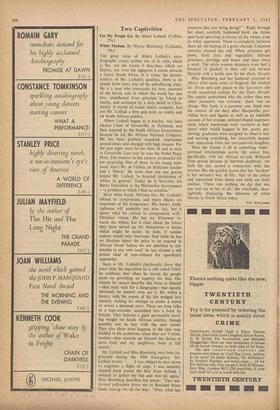Two Captivities
THE great value of Albert Luthuli's auto- biography comes neither out of its style, which is flat, nor the events it describes, which are history, nor even the signposts it erects towards a future South Africa. It is rather the demon- stration of Mr. Luthuli's qualities, there to be mined from every line of his self-effacing story. He is a man who transcends his time, unaware of the heroic role in which the world has cast him, undeflected from principle by friend or enemy, and animated by a deep belief in Chris- tianity. It would all sound utterly romantic, had not Mr. Luthuli a firm grip both on reality and on South African politics.
Albert Luthuli began as a teacher, was later elected Chief of Groutville, in Zululand, and then deposed by the South African Government because he led the African National Congress. He has been publicly assaulted, imprisoned several times and charged with high treason. For the past eight years he has been ill and in exile in Groutville. Last year he won the Nobel Peace Prize. The mentors in this austere, purposeful life are surprising. One of them, in his young man- hood, was a Mr. de Villiers, an Afrikaner teacher and a 'liberal.' He more than any one person helped Mr. Luthuli 'to forestall intolerance of whites in general.' Today he is Secretary for Bantu Education in the Nationalist Government —`a problem to which I find no solution.' Most white South Africans fear Mr. Luthuli's refusal to compromise, and many blacks are impatient of his temperance. His book's forth- rightness will probably not alter this, but it shows what he refuses to compromise with: Christian values. He has no bitterness to- wards the whites, but is clear about the future they have stored up for themselves—a future which might be easier, he feels, if outside nations would only intervene. And while he has no illusions about the price to be exacted in African blood 'before we are admitted to citi- zenship in our own land,' he has created a still potent ideal of non-violence for apartheid's opponents.
Such is Mr. Luthuli's charismatic force that years after his deposition he is still called Chief; he confesses that when he travels his people insist on providing an equerry for him. Ob- viously he cannot describe this force in himself —that must wait for a biographer—but equally obviously he doesn't even see it. He writes a. history with the events of his life wedged into context, making no attempt to evoke a mood or reveal a personal story. These are long talks to a tape-recorder, assembled into a book by friends. They indicate a giant personality exert- ing weight on South African politics, though possibly not in key with the new mood. They also show what happens to the rare man faithful to his ambitions, when they are 'I think, modest—they scarcely go beyond the desire to serve God and my neighbour, both at full stretch.'•
Mr. Luthuli and Miss Blumberg were both im- prisoned during the 1960 Emergency. Mr. Luthuli writes: `. . . I was obliged to slow down to negotiate a flight of steps. I was instantly slapped hard across the face from behind. I stooped to gather my hat and was hit again.' Miss Blumberg describes her arrest: 'Two uni- formed policemen drove me to Roeland Street Gaol, teasing me all the way : "Man, what has someone like you being doing?" ' Right through her short, carefully fashioned book, she shows apartheid operating in favour of the whites, even its white opponents. There is complicity between them all; the feeling of a great charade. Coloured convicts cleaned her cell. White prisoners got stews, fresh fruit and vegetables; African prisoners, porridge and beans and meat twice a week. The white women detainees even had a bouquet of gladioli in their cell and brewed Nescafe with a kettle sent by the Daily Herald.
Miss Blumberg and her husband returned to Africa after some years in England. He worked for Drum and sent pieces to the Spectator; she wrote occasional articles for the Daily Herald. She cannot understand why she rather than any other journalist was arrested: there was no charge. Her book is a personal one, fitted into the context of the days after Sharpeville, pro- viding facts and figures as well as an indelible account of her strange, semi-privileged imprison- ment, where wardresses were 'secretive as bats' about what would happen to her, pretty psy- chology graduates were assigned to observe her; and staining everything, her intractable despair over separation from her two-year-old daughter.
Then she frames it all in something wider: personal relationships across the colour line, specifically, with her African servant. Released from prison because of 'nervous depletion,' she feels she has earned a connection with this woman. But she quickly learns that her 'incident' is her servant's way of life: fear of the police and separation from home and child are daily realities. 'There was nothing we did that was any real use to her at all,' she concludes, clear- sightedly displaying the dilemma of white liberals in South Africa today.
PAT WILLIAMS


































 Previous page
Previous page